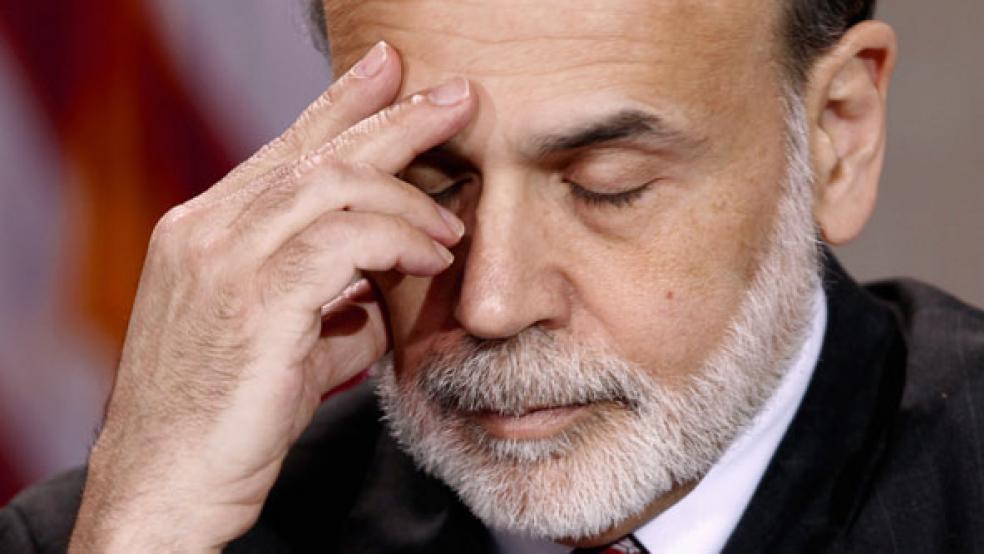Two key central bank meetings and a string of big data releases in the coming week should sharpen the debate over slowing growth and rising inflation risks, and may shake the markets out of the doldrums which followed a bumper first quarter for asset prices.
The U.S. Federal Reserve's monetary policy committee will update its economic forecasts for the first time since January at its mid-week meeting, when no policy change is expected but where recent indicators have disappointed investors, while the Bank of Japan is seen as likely to ease its policy further at a meeting on April 27 after coming under intense pressure to help support the still fragile economy. The meetings come after two other central banks, the Bank of England and Bank of Canada, last week surprised markets with more hawkish statements suggesting it was less likely they would need any more monetary policy stimulus.
"We're at a point where the nexus of the risks between growth and inflation might get more interesting over the next couple of months," said Ned Rumpeltin, head of G10 FX strategy for Standard Chartered Bank.
After a wave of policy easing measures earlier this year led by the Federal Reserve and including a huge 1 trillion euro injection of liquidity by the European Central Bank, there are some signs that growth has stabilized leaving room for monetary authorities to give more weight to inflation risks. Earlier this month Singapore said it will tighten monetary policy slightly because of persistent inflationary pressures, while Australia's central bank opened the door for a rate cut in May when it held rates steady. The Reserve Bank of New Zealand holds its rate setting meeting on April 26 where rates are expected to remain unchanged but inflation concerns could feature in the accompanying statement.
At the center of the concerns are oil prices, with Brent crude currently at an average price of about $118 barrel for the year to date, which if it is maintained for 2012 as a whole would be a record.
FUND VIEWS SHIFT
Many institutional investors have also been gradually raising their expectations for inflation, according to the latest Bank of America Merrill Lynch survey of fund managers. Global inflation expectations rose to nine month highs in the survey conducted in the week to April 12. "It's not at anything like alarming levels at this point, but what it does do is reinforce the message that there is very little love for bonds at current levels," said Gary Baker, European equity strategist at BofA Merrill Lynch.
Overall global growth is still seen as subdued by most economists with weakness in the euro zone and a relatively slow U.S. recovery leaving Asia as the main driver. A Reuters poll of more than 700 economists across the world, taken in the past week, predicted a modest 3.3 percent growth in the global economy this year, unchanged from a poll taken three months ago.
GDP DATA
In the coming week the United States and Britain will unveil their preliminary estimates of first quarter growth. The U.S. economy is expected to grow at an annual rate of around 2.5 percent in the first three months of the year, down from 3.0 percent in the final quarter of 2011. Britain's economy is much weaker, with GDP falling by 0.3 percent in the final quarter of last year and a fairly anemic growth of 0.1 percent expected in the first three months of 2012. However, if economists' forecasts are missed and a negative number results, the country will technically be in recession.
In the markets a general scaling back in growth forecasts and the return of concerns over euro area government finances have largely ended the rally in risk assets that marked the first quarter. World equities have seen about 5 percent wiped off the gains to the end of March, leaving global stocks up about 8.5 percent for the year, with emerging markets and the share markets of Spain and Italy underperforming.
In the foreign exchange market, the shifts have seen one-month volatility of the euro's exchange rate to the dollar drop to levels not seen since before the Lehman crisis, reflecting a view that swings in the common currency in the near term are likely to be very low.
Volatility as indicated by the VIX index (a popular measure of the implied volatility of S&P 500 index options) has rapidly declined since the end of 2011 to hit historic lows last month, though it has kicked up a bit lately as the U.S. economic data has surprised.
It may be time for volatility to pick up further.




